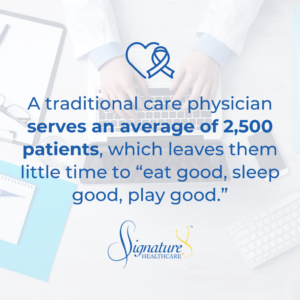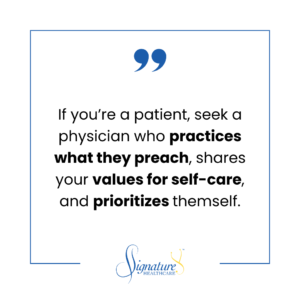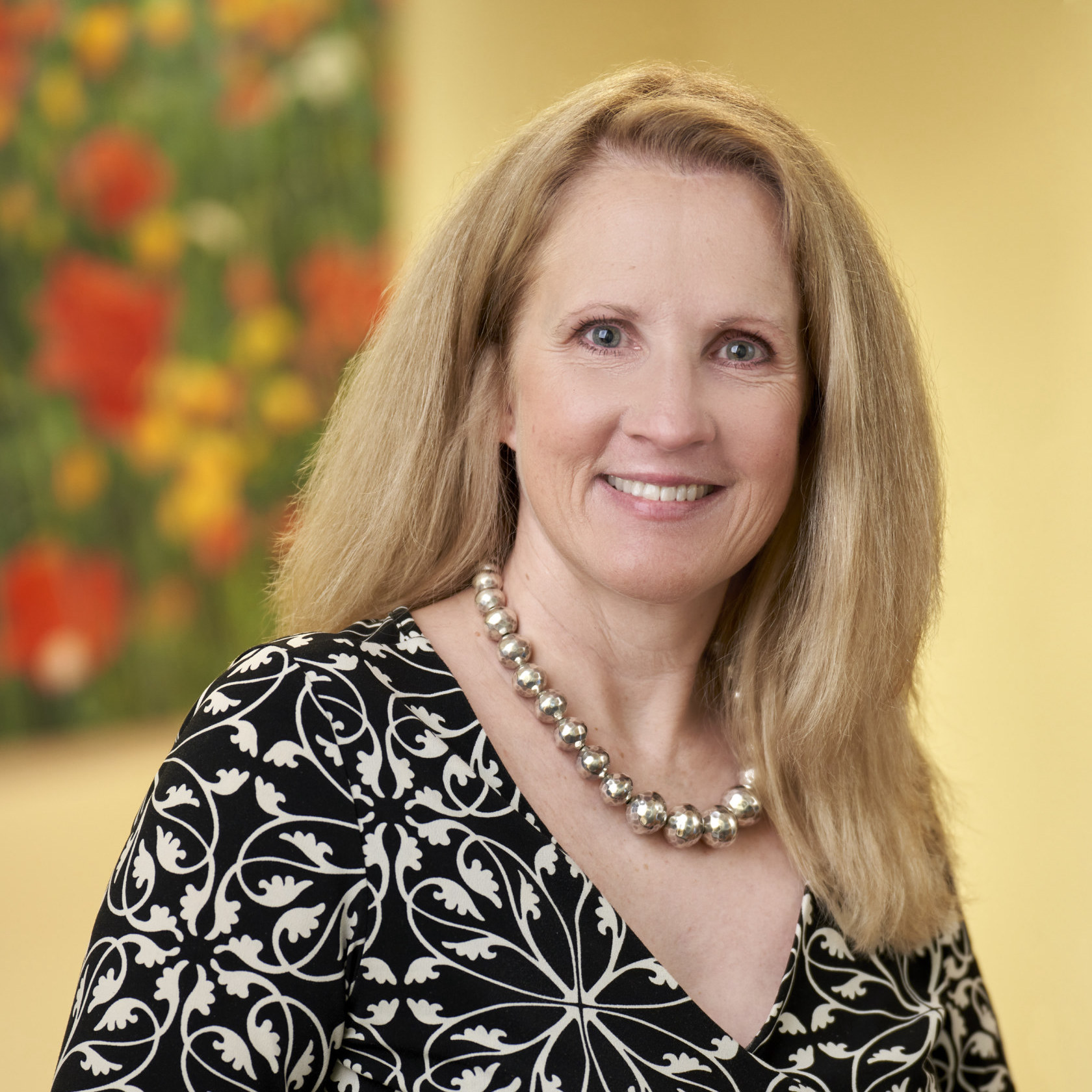Why Your Doctor Should Prioritize Work-Life Balance
Many working adults spend at least two weeks away from their jobs each year; some as many as four.
But with patients continually depending on them, can doctors do the same?
The answer is yes. Although some physicians don’t take a break, those who do return refreshed, at the top of their game, and better able to deliver optimal care.
At Signature Healthcare, our physicians realize that life isn’t just about work. Self-care fosters longevity and a long lifespan with robust health.
Many people think achieving long years of good health is complicated, but it just boils down to some very simple advice my husband gave our kids when they were little:
Eat good. Sleep good. Play good.
I adore international travel. I love to step away from the office and satisfy that urge to recharge. It’s my version of “play good.”
This is possible because our concierge practice commits to policies and processes that maintain our patient experience even when our physicians are traveling. My patients still receive high-quality care when I’m out of the office.
The “Treadmill”
When I travel, people are often surprised to hear I’m a physician. Traditional healthcare doctors are often bound to the office and too swamped by work to plan a vacation.
A traditional care physician serves an average of 2,500 patients, which leaves them little time to “eat good, sleep good, play good.” They’re also subject to the guidelines of insurance companies, the government, and their healthcare structure, constraining how they provide their services.
Many overworked traditional care doctors say, “I need to get off the treadmill.” Each year, the healthcare system seems to increase its speed or incline, leaving physicians working a little faster. They have less time for effective patient care… or self-care.
Signature Healthcare’s standard of care considers the patient’s and physician’s well-being equally vital.

Travel Enriches Me as a Doctor
When I travel the globe, I visit places I’ve never been, learning about cultures with remarkable practices we don’t find in this country. It’s a privilege to experience this.
I often ask questions about local healthcare systems and how they work. It’s eye-opening to look at different approaches.
My interest and inquisitiveness are critical to my concierge role back home. I’m exposed to new ideas and treatments that enhance my skills and abilities as a physician.
In concierge medicine, relationships are paramount and central to our work. My travel experiences make me more well-rounded, so I can better connect with all kinds of patients as we build our relationships.
Practice What You Preach
With my patients, I always emphasize the importance of self-care, work-life balance, stress management, and pursuing hobbies. It’s also important to practice what I preach.
A small example: The two-dose shingles vaccine is recommended for people over 50, but many avoid getting it, fearing potential side effects. I procrastinated receiving the vaccine because I was concerned about side effects and didn’t have time to be sick.
But whenever I recommended the vaccine to patients, they’d ask, “Have you gotten it yet?” Once I did, I could look them in the eye and say, “I did, and let me tell you about my experience with it.”
Recently, I spoke with a patient about getting a cardiac calcium score screening test for heart disease. When the patient asked if I’d been screened, I confirmed I had!
Smile and Enjoy Life
Doctors have greater credibility with patients if we practice what we preach. And that includes how we approach longevity and health span. People often seek a complex formula to live longer and better, but the answer is simple: you must care for your body and soul.
Nurture your body and manage stress with a healthy diet, exercise, and good sleep… and by finding ways to smile and enjoy life.
Several years ago, when a Duke University study showed exercise to be as effective as prescription medication to manage stress, anxiety, and depression, a late-night talk show host piped up, “So, ask your doctor if getting off your a** is right for you!” The audience laughed — which, in my humble opinion, is the best medicine and is 100% good for you.
In a traditional primary care model, I’d rush through seeing 20 patients daily while checking test results and renewing prescriptions. However, as a concierge physician, I care for just 10% of that patient slate.
I reap the benefits of my healthy work-life balance, which energizes the attention I give my patients. I come to work every day refreshed and invigorated. I’m present when I discuss a patient’s concerns with them instead of treating them as quickly as possible so I can move on to the next patient.
In concierge care, I can slow down and think — often outside the box. If the patient has already tried multiple remedies for an ailment, I have time to stop and consider what we might try next before referring them to a specialist.
Round-the-Clock Patient Support
Have you ever had a medical issue after hours when your doctor was away?
If you’re a traditional primary care practice patient, you may have called and reached an answering service. Many large, busy medical practices use call centers, sometimes operated by a third party in a different city.
The person who answers the phone is often a nurse unaffiliated with your practice and without access to your records, who’ll likely send you to an ER or suggest you call your physician’s office in the morning.
At Signature Healthcare, an out-of-office doctor isn’t an issue for our patients. Our care team collaborates closely with our physicians and is familiar with our patient panel. If I’m away, one of my colleagues will access your records, review your chart, and address your needs quickly.
Closing Thoughts on Self-Care
Taking time off for travel isn’t just healthy for the soul. It also means I can deliver high-quality healthcare to my patients.
Let’s face it: We spend most of our lives at work. If doctors don’t have a healthy work-life balance, it affects their relationships with friends and family and makes it difficult for them to do their jobs effectively. An overworked doctor may even make a mistake or miss an important diagnosis.
If you’re a physician — whether within a traditional healthcare system or an alternative model — prioritize yourself. Or, find a different healthcare environment that fulfills you and lets you practice medicine the way you like. It’ll enable deeper connections with your patients.
If you’re a patient, seek a physician who practices what they preach, shares your values for self-care, and prioritizes themself. It’ll foster a more meaningful patient-doctor relationship.
At Signature Healthcare, our doctors have a great work-life balance and want that for you, too. We’re here whenever you need us. We’d love to talk!


Dr. Elizabeth Perry
Dr. Perry is board-certified in internal medicine, holding a medical degree from the Medical College of Virginia. She completed residencies in internal medicine at the University of Pennsylvania Hospital and in emergency medicine at Johns Hopkins Hospital. Dr. Perry served as the chairperson of the Health Services Committee for the Charlotte Chamber of Commerce in 2006-07 and received the Charlotte Business Journal’s “Women in Business Achievement Award” in 2006. She, her husband Jon, and their three children enjoy outdoor activities and travel.

